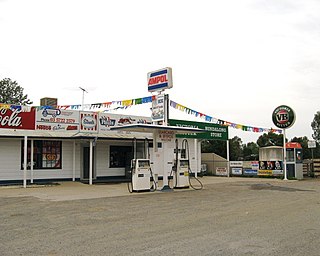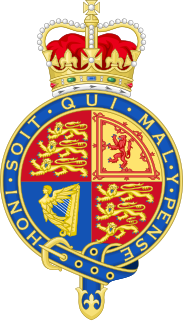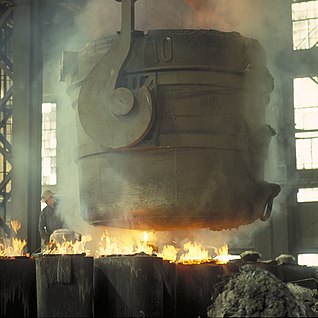
A board of directors is a group of people who jointly supervise the activities of an organization, which can be either a for-profit business, nonprofit organization, or a government agency. Such a board's powers, duties, and responsibilities are determined by government regulations and the organization's own constitution and bylaws. These authorities may specify the number of members of the board, how they are to be chosen, and how often they are to meet.
Section 51(xx) of the Australian Constitution, is a subsection of Section 51 of the Australian Constitution that gives the Commonwealth Parliament the power to legislate with respect to "foreign corporations, and trading or financial corporations formed within the limits of the Commonwealth". This power has become known as "the corporations power", the extent of which has been the subject of numerous judicial cases.
The Llanelly Railway and Dock Company was an early Welsh railway system. It opened its first short line and a wet dock at Llanelly in 1834, and soon went on to build a longer line from Llanelly to serve pits in the Amman Valley, and then on to Llandilo, reached in 1857. The Llanelly company leased and worked the Vale of Towy Railway on to Llandovery, from 1858.

Zaporizhstal is Ukraine's fourth-largest steel maker with an annual capacity of 4.5 million tonnes of steel, 3.3 million tonnes of pig iron, and 4.1 million of finished steel products, and ranks 54th in the world. The leader of the national industry is Kryvorizhstal. The company is Ukraine's only manufacturer of cold-rolled sheets, used in car manufacturing, as well as tinplates and polished stainless and alloyed steel. Zaporizhstal is located in the city of Zaporizhia, in a region with the highest per capita electricity output in Ukraine, close to raw material suppliers and steel consumers. The company was founded in 1933.

English trust law concerns the creation and protection of asset funds, which are usually held by one party for another's benefit. Trusts were a creation of the English law of property and obligations, but also share a history with countries across the Commonwealth and the United States. Trusts developed when claimants in property disputes were dissatisfied with the common law courts and petitioned the King for a just and equitable result. On the King's behalf, the Lord Chancellor developed a parallel justice system in the Court of Chancery, commonly referred as equity. Historically, trusts were mostly used where people left money in a will, created family settlements, created charities, or some types of business venture. After the Judicature Act 1873, England's courts of equity and common law were merged, and equitable principles took precedence. Today, trusts play an important role in financial investments, especially in unit trusts and pension trusts, where trustees and fund managers usually invest assets for people who wish to save for retirement. Although people are generally free to write trusts in any way they like, an increasing number of statutes are designed to protect beneficiaries, or regulate the trust relationship, including the Trustee Act 1925, Trustee Investments Act 1961, Recognition of Trusts Act 1987, Financial Services and Markets Act 2000, Trustee Act 2000, Pensions Act 1995, Pensions Act 2004 and the Charities Act 2011.

The United Kingdom company law regulates corporations formed under the Companies Act 2006. Also governed by the Insolvency Act 1986, the UK Corporate Governance Code, European Union Directives and court cases, the company is the primary legal vehicle to organise and run business. Tracing their modern history to the late Industrial Revolution, public companies now employ more people and generate more of wealth in the United Kingdom economy than any other form of organisation. The United Kingdom was the first country to draft modern corporation statutes, where through a simple registration procedure any investors could incorporate, limit liability to their commercial creditors in the event of business insolvency, and where management was delegated to a centralised board of directors. An influential model within Europe, the Commonwealth and as an international standard setter, UK law has always given people broad freedom to design the internal company rules, so long as the mandatory minimum rights of investors under its legislation are complied with.
Unfair prejudice in United Kingdom company law is a statutory form of action that may be brought by aggrieved shareholders against their company. Under the Companies Act 2006 the relevant provision is s 994, the identical successor to s 459 Companies Act 1985. Unfair prejudice actions have generated an enormous body of cases, many of which are called "Re A Company", with only a six-digit number and report citation to distinguish them. They have become a substitute for the more restrictive conditions on a "derivative action", as an exception to the rule in Foss v Harbottle. Though not restricted in such a way, unfair prejudice claims are primarily brought in smaller, non public companies. This is the text from the Act.

Greenhalgh v Arderne Cinemas Ltd [1946] 1 All ER 512; [1951] Ch 286 is UK company law case concerning the issue of shares, and "fraud on the minority", as an exception to the rule in Foss v Harbottle.
Directors' duties are a series of statutory, common law and equitable obligations owed primarily by members of the board of directors to the corporation that employs them. It is a central part of corporate law and corporate governance. Directors' duties are analogous to duties owed by trustees to beneficiaries, and by agents to principals.

Southern Foundries (1926) Ltd v Shirlaw [1940] AC 701 is an important English contract law and company law case. In the field of contracts it is well known for MacKinnon LJ's decision in the Court of Appeal, where he put forth the "officious bystander" formulation for determining what terms should be implied into agreements by the courts. In the field of company law, it is known primarily to stand for the principle that damages may be sought for breach of contract by a director even though a contract may de facto constrain the exercise of powers to sack people found in the company's constitution.
Shuttleworth v Cox Bros and Co (Maidenhead) [1927] 1 Ch 154 is a UK company law case, concerning alteration of a company's constitution.

Howard Smith Ltd v Ampol Petroleum Ltd, is a leading UK company law case, concerning the duty of directors to act only for "proper purposes". This duty has been codified into the Companies Act 2006 section 171, and arises particularly in cases involving takeover bids.

Automatic Self-Cleansing Filter Syndicate Co Ltd v Cuninghame [1906] 2 Ch 34 is a UK company law case, which concerns the enforceability of provisions in a company's constitution.
Corporate litigation in the United Kingdom is that part of UK company law which gives investors the right to sue the directors of a company, or vindicate another wrong to the company, particularly where the board of directors does not wish to act itself.
Borland’s Trustee v Steel Brothers & Co Ltd [1901] 1 Ch 279 is a UK company law case, concerning the enforceability of a company's constitution and the nature of a company share. It is also one of the rare exceptions to the rule that a transfer of assets which only takes effect upon a person's bankruptcy is normally void.

Pigot's Case (1614) 1 CoRep 26b, [1558-1774] All ER Rep 50, 77 ER 1177 is a 17th-century decision of the English courts. It is often simply referred to by reference to the rule in Pigot's Case. The rule has been described as a "ghost of the past".

Citco Banking Corporation NV v Pusser's Ltd [2007] UKPC 13 is a judicial decision of the Privy Council on appeal from the British Virgin Islands in relation to the validity of amendments to the memorandum and articles of association of a company, and the requirement of shareholders to exercise the votes attached to their shares in the best interests of the company as a whole.











